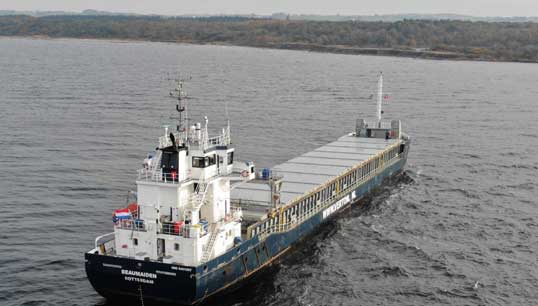
A Dutch-flagged general cargoship ran aground off the coast of Denmark when the bridge was left with no one at the controls for around four hours after the master fell asleep.
A Danish Maritime Accident Investigation Board report on the incident – which involved the 2,545gt Beaumaiden – concludes that vital safeguards were missing, with crewing levels and work schedules making it difficult to provide a night-time lookout.
The Rotterdam-registered vessel was sailing from Antwerp to Tallin with a cargo of fertiliser when it grounded on rocks off Bornhom, Denmark, in October last year. The ship was freed by a tug and was found to have damaged a ballast tank, the hull and the forepeak, but there was no pollution and no one was injured.
Investigators found that the master had been drinking wine while alone on watch. After going to his cabin to use the toilet he fell asleep and the ship continued on its course, at 10 knots, until it ran aground four hours later.
Safeguards which should have prevented the accident were not in place, with the bridge navigational watch alarm system (BNWAS) having been switched off. Crew members said they did not usually use the system because the reset button – which had to be used every three to 12 minutes – could not be reached from the navigational chair.
The ship was running with seven crew members – the master, three officers and three ratings – and the DMAIB said the company's procedures failed to explain how the 'conflicting goals' of ratings' work schedules and night-time lookout requirements could be resolved.
'In practice the ship's crew found it difficult to meet the requirement of having the deck ratings performing lookout duty at hours of darkness while also completing the required maintenance tasks on deck,' the report states.
'Specifically, the AB who was the ship's cook did not manage to perform all the prescribed duties and practically worked full time as the ship's cook.'
Investigators noted that the company's policies also required the officer leaving the bridge to assess whether the relieving officer was fit for duty. 'The chief officer did not notice anything unusual about the master before he took over the watch even though he had some wine prior going to the bridge,' the report adds.
The DMAIB said the master's alcohol consumption may have impaired his judgement and led to him falling asleep and not waking up during the grounding.
But the investigators said they particularly wanted to 'uncover how it went unnoticed by the other crew members that nobody was in control of the ship for such a prolonged period'.
Noting that the master had to go to his cabin because the bridge toilet did not flush properly and that there was no lookout because the work schedules did not allow for all the duties to be performed, the report concludes: 'Although alcohol was a causal factor in the grounding, the investigation also unveiled other problems related to the safe navigational watchkeeping on Beaumaiden, which contributed to the ship's grounding'.
The report says the ship management company Vertom Bereederungs has since introduced a 'zero tolerance' policy for drinks and drugs onboard its vessels.
Tags
More articles
Norwegian court rules crew negligence key factor in loss of Cheshire ordering Bibby Transport to pay compensation
British shipping company Bibby Transport and Singapore-based operator J. Lauritzen have been ordered to pay compensation and costs totalling around US$30m following an accident in 2017, in which an Isle of Man-flagged ship and its fertiliser cargo were destroyed.
'Working Safely At Sea': a campaign for better safety awareness in the maritime sector
Every year unnecessarily injuries and even fatalities happen in maritime. The Dutch Safety Board's annual 'Shipping Accident Report' shows that almost half of the incidents at sea involve an industrial accident.
Bahamas Maritime Authority releases report into Pride of Hull engine room fire
The Marine Accident and Investigation Branch (MAIB) has shared the Bahamas Maritime Authority (BMA) investigation into a fire that resulted in the disablement of the Bahamas-registered ferry Pride of Hull last year.
Investigation begins into Scot Carrier and Karin Høj collision
A preliminary investigation into gross negligence in maritime traffic is being conducted, following a collision between the UK-registered Scotline general cargo vessel Scot Carrier and Danish-registered construction ship Karin Høj.
